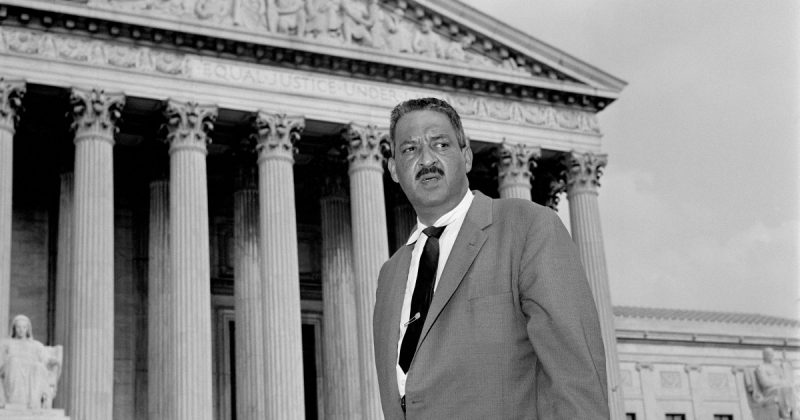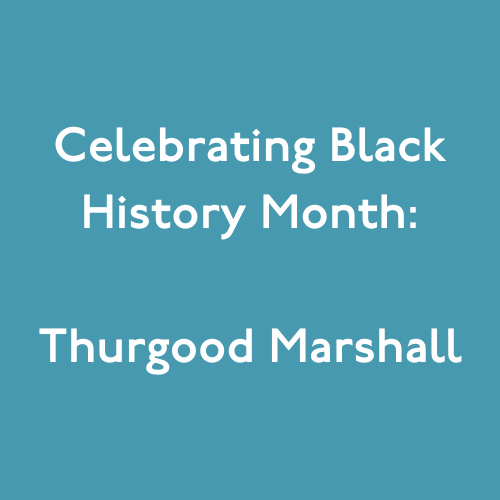This month, we’re celebrating influential Black leaders who have improved social emotional learning opportunities for all students.
“We will only attain freedom if we learn to appreciate what is different and muster the courage to discover what is fundamentally the same.”
– Thurgood Marshall

The work of building equity, safety, and support in our schools should be nothing less than a top priority for leaders across classrooms, schools, and districts. It takes continued care and commitment from Upstanders to ensure that all students get the high-quality education that they deserve.
In 1896, the U.S. Supreme Court upheld the “separate but equal” doctrine that ensured that racial segregation would not just live on, but would be protected under law, restricting educational opportunities for Black students.
Nearly 60 years later, a young lawyer named Thurgood Marshall would argue before the Court that this doctrine was not just wrong, but unconstitutional. His victory in that case would leave a lasting legacy of justice and educational equality for students that lives on to this day.
Who was Thurgood Marshall?
Born in Baltimore, Maryland, on July 2, 1908, Thurgood Marshall is one of the most recognizable figures in U.S. Supreme Court history. His mother was a school teacher while his father was a railroad porter who instilled in young Thurgood an appreciation for the U.S. Constitution and set his son on his path toward the Supreme Court.
Throughout his academic career at Lincoln University and later Howard University School of Law, Marshall was a fierce advocate for civil rights, participating in sit-in protests and fighting against segregation wherever he could. He graduated first in his class at Howard in 1933.
In 1934, Marshall began what would become a 25-year affiliation with the National Association for the Advancement of Colored People (NAACP) when he successfully represented a Black law student named Donald Gaines Murray who had been denied admission to University of Maryland Law School because of the school’s racial segregation policies. In 1935, Marshall founded and became the executive Director of the NAACP Legal Defense and Education Fund, an organization concerned with advancing equality in educational opportunities, among other civil rights causes.
Perhaps Marshall’s greatest contribution to the education landscape is his most famous case, Brown v. Board of Education. In 1954, Marshall successfully argued before the Supreme Court that the “separate but equal” doctrine of public education, established nearly 60 years earlier by Plessy v. Ferguson, was unconstitutional.
President John F. Kennedy appointed Marshall to the United States Court of Appeals in 1961, and in 1965, President Lyndon B. Johnson named him as the United States Solicitor General, making him the first African American to hold that position and the highest-ranking Black government official in U.S. history.
Thurgood Marshall’s Lasting Impact on Education
Before Brown v. Board of Education, public schools were segregated under the “separate but equal” doctrine, meaning that schools could deny admission to Black students and families so long as the students had access to schools that were deemed to be “equal.” This state-sponsored segregation further entrenched the harmful effects of racism in our society.
We understand that education has the power to shape childrens’ future and instill in them the qualities to reach their full potential. This can only happen if students have truly equal opportunities to get a high-quality education that nurtures not just their academic achievement, but their social and emotional development as well.
Social emotional learning is at the root of all learning, and it happens everywhere. Ensuring that students are learning in communities that value and elevate safety, equity, and support for all facets of a students development is critical for shaping their future.
Without the ruling in Brown v. Board of Education and Thurgood Marshall’s contributions to defeating “separate but equal,” our education landscape might look very different today. While the work of creating safe and equitable schools for all students is ongoing, Thurgood Marshall’s contributions as a lawyer and judge have ensured that students today are able to learn in a more just and equal society.
As we celebrate the impact of influential Black leaders in education this month, we give gratitude to Thurgood Marshall . Join our us for a deep breath of gratitude for his work, impact, and ever-growing legacy.
How are you celebrating Black History Month? Share this article on social media to celebrate Thurgood Marshall, and let us know who else you are learning about this month!
Learn more about Thurgood Marshall
Thurgood Marshall’s unique Supreme Court legacy [Constitution Daily, 2021]
Who was Thurgood Marshall? [NAACP Legal Defense Fund]
Brown v. Board of Education re-enactment activity download [US Courts]










